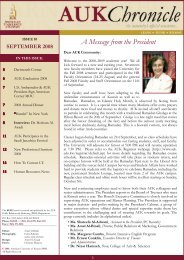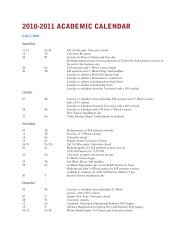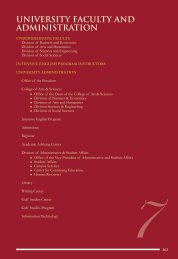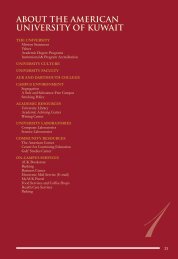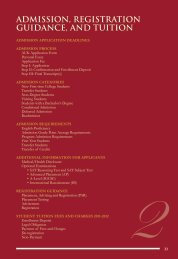The Impact of a Glass Ceilingon Women in KuwaitAthmar Al-SalemAbstractThe aim of this research was to determine whether or nota glass ceiling exists in Kuwait, or - in other words - whetheror not women in Kuwait are being prevented fromgetting promoted to top corporate positions. This wasdone through a survey of the makeup of the managerialhierarchies of several business organizations in Kuwait.As a close evaluation of our observations indicated, theremay indeed be a glass ceiling in Kuwait.The data used in this study was collected by students whoconducted interviews with various managers as part ofan assignment for an introductory management course.Initial data collection was supplemented with follow-upinterviews with executives at each study location in orderto confirm the accuracy of the data initially collectedand to pose further questions relating to a potential glassceiling at each workplace. The initial data collected wasthen collated and the common responses obtained weresummarized in a report.The analysis of the answers obtained through this studyis the very core of this report, as it furnishes various hintsabout the existence or absence of a glass ceiling in thecountry. Indeed, the issues identified and discussed in thisreport serve as an important basis for a more in-depthunderstanding of local culture and how it influencesmanagement, and their implications may well extend tothe other Gulf States and much of the Middle East.IntroductionThe term “glass ceiling” most commonly refers to thecondition in which top-level management in businessesis dominated by men. A "ceiling" is suggested becausewomen are seen as limited in how far they can advanceup organizational ranks, and the ceiling is linked to aglassy barrier because the various limitations impeding thepromotion of women to the upper part of the corporateladder are not as apparent.It is important to note here that the "glass ceiling" isdistinguished from formal barriers to advancement, suchas education or experience requirements. Furthermore,when the meaning conveyed by this term is extended toother groups, such as racial or ethnic minorities, it is usuallymade with direct or indirect reference to Gender. 1 Andwhile the “glass ceiling” term is most often used to referto women's access to upper management, it also refers tothe general tendency for women to be underrepresentedat higher levels of the occupational hierarchy. 2The Glass Ceiling in KuwaitLike many modern trends and notions in the field of seniormanagement, the term “glass ceiling” is not widely knownin Kuwait. Seldom can anyone find an article in a Kuwaitinewspaper speaking about management in general, letalone specific managerial-related terms. Therefore, aninterest in the academic meaning of terms related tomanagement and marketing in general is quite lacking inKuwait, and that is precisely why it is often difficult for oneto prove something as either prevailing in Kuwait or not.What makes a study of the “glass ceiling” term in Kuwaiteven more challenging is the fact that the promotionof women to top managers is generally related to theirexperience and cannot easily be judged in Kuwait, wherewomen only started contributing to the workforce withinthe last 25 years. The part of the Kuwaiti labor forceconsisting of women tends to be concentrated within thefields of government education and health care, whichmeans that not enough managerial experience has beengained by females in the country over the past years.In an effort to unravel the glass ceiling mystery in Kuwait,articles on the subject were searched for, yet barely anycould be found. The only article that actually tackled thetopic to a certain extent was found in “Khaleej TimesOnline”, and it consisted of a long discussion of theterm as it applies in only one of the Gulf CooperationCouncil countries – the United Arab Emirates. 3 It listedexamples of different women from the United ArabEmirates, while completely ignoring the other countriesin the G.C.C. region. In fact, the writer of the article didnot even attempt to clearly define the term but, instead,merely provided the reader with hints about the topic inquestion. Apart from this exception, one generally cannotfind articles discussing this particular subject in the G.C.C.media in general and the Kuwaiti media in particular.51 2 3
6Hence, in order to proceed with this research and to gainsome insight into how people generally perceive the statusof female managers in the Kuwaiti corporate world, theonly option was to resort to questionnaires addressing the“glass ceiling” term. A random sample population waschosen for this study, the results that were accumulatedhave reflected the Kuwaiti population’s perception of theglass ceiling in a way that might enable one to conclude theexistence of the phenomenon of glass ceiling in Kuwait.In Kuwait, the glass ceiling is evident in virtually allcompanies and government sectors. Most companiesin Kuwait are run by men, except for a few limitedcompanies that are run by women. Among the thingsthat were done to survey public opinion on the term athand was to ask interviewees about the number of malesworking in their companies. Then, the interviewees wereasked about the number of female managers working intheir company in order to determine the extent to whichthe company members, given an expectedly large numberof males working as juniors, would prefer to have a femalemanager working with them. Finally, questions were posedto determine whether the company, when advertisingfor managerial posts, used statements implying that itwas seeking males only, or that it preferred males. Theresearch was done in discretion, so as not to influence theinterviewees’ responses, and great care was taken to detectany signs of a glass ceiling in the process, even when thesubjects did not in any way hint to its presence.Eventually, several important and interesting conclusionswere drawn from the results accumulated in this study.First, it was found that, although more than half of theKuwaiti population consists of expatriates, not many ofthe latter are females who could be found in managerialpositions. Second, it turned out that the majority of themanagers that were interviewed in this study did not knowthe meaning of the term ‘glass ceiling’, even though the vastmajority of companies in Kuwait apply foreign standardsand tend to have both regional and foreign expansion plans.Yet, it is worth noting perhaps that these same managerswere altogether unclear about the presence or absence ofany discrimination in the recruitment or promotion ofwomen to top management or senior positions in theircompanies. The third and most important result thatwas found is that most of the subjects did not know thenumber of female managers in their company; the onlything they knew for sure was that females were presentin significantly lower numbers than males. Consideringthe notably low numbers of female managers that wereencountered in the vast majority of companies studied,it seems quite surprising that the term was not betterrecognized by the people working in these companies.When asked about whether or not they tend to advertisefor male managers rather than female managers, nearlyall of the companies studied asserted that they do notpublish gender-biased ads, stating that this tendencyused to be the case in the past, but not nowadays. Thismight at first lead one to infer a growing awareness ofthe importance of eliminating discrimination betweenmale and female managers in Kuwait; yet, the majorityof these same companies admitted to hiring mostly malemanagers for junior positions, stating that their employeesgenerally did not feel comfortable working with people ofthe opposite gender. Many male employees, for example,did not like taking orders from female managers, andcherished having the freedom to move around and totravel as and when they please.It is important to note here that the glass ceiling doesnot merely relate to the recruitment and appointment ofmanagers, but manifests itself in various forms. Anotherform of the glass ceiling, for example, is the discriminationin salaries between female and male managers in Kuwait.Sadly enough, the majority of women managers that wereinterviewed as part of this study agreed that there is indeeddiscrimination in salaries between men and women, eventhough it differ in its degree from company to company.A manager at a prominent company in Kuwait mentionedthat she herself happened to be in a position where hersalary value is often manipulated by her superiors - oftenfrom month to month.Ultimately, what made this research on the glass ceilingin Kuwait especially challenging is the fact that, althoughdiscrimination between males and females in the workplaceused to be overt in the old days, such discrimination tendsto be somewhat less evident nowadays. At one point, it wasnot acceptable in Kuwaiti society for a woman to travelalone or to work, and women in general were expected toabide by certain traditions, values and rules that tend tobe conservative in nature. Eventually, some of these ruleswere broken in the private sector, and more quickly so thanin the government sector, due to the greater flexibility ofthe private sector. This happened because, over the years,many educated women faced aggravation and hostility inthe workplace in a way that often forced them to quit andestablish their own company. As a result, new companieswere established in Kuwait that, in turn, gave more and
- Page 2 and 3: About AUK Occasional Papers:The AUK
- Page 4 and 5: higher education is distinguished b
- Page 8 and 9: more women a chance to flourish in
- Page 10 and 11: consider other factors such as the
- Page 12 and 13: academically unprepared…you must
- Page 14 and 15: EmotionalSignificant variations in
- Page 16 and 17: Advising and OrientationOther impor
- Page 18 and 19: etention. However, in addition, the
- Page 20 and 21: Hadi and Llabre (1998) assessed int
- Page 22 and 23: the event was encoded in parallel a
- Page 24 and 25: Public Health Impacts of Iraq’s 1
- Page 26 and 27: college work and have inadequate pr
- Page 28 and 29: memorization and repetition. This a
- Page 30 and 31: other in the pursuit of higher grad
- Page 32 and 33: for quality assurance, an organizat
- Page 34 and 35: RethinkingEntrepreneurship:Integrat
- Page 36 and 37: This type of training leads to enha
- Page 38 and 39: In short, Mount Allison students ha
- Page 40 and 41: Joplin, L. (1995). On defining expe
- Page 42 and 43: Figure 1. ExperientialEntrepreneurs
- Page 44 and 45: Kuwait - satellite television, cult
- Page 46 and 47: ReferencesAbt, V. & Seesholtz, M. (
- Page 48 and 49: interest in continuing to manipulat
- Page 50 and 51: Though corruption poses fundamental
- Page 52 and 53: A Cross-Cultural Modelof Innovation
- Page 54 and 55: were conceived as associations of c
- Page 56:
others. In this case, confident pos
- Page 59 and 60:
58REFERENCESAmason, A. (1996) ‘Di
- Page 61 and 62:
Shelton, C. and Darling, J. (2004)
- Page 63 and 64:
62• recycle natural resources use
- Page 65 and 66:
64Table Kuwait Fact Profile on Tran
- Page 67 and 68:
Table Transportation and Associated
- Page 69 and 70:
68• Third, each mode of transport
- Page 71 and 72:
70• Prepare a Bank Group transpor
- Page 73 and 74:
7219. Stratford,A. (1974). Airports
- Page 75 and 76:
74may be developed in a safe and or
- Page 77 and 78:
28. Tables - 1 Environmental Manage
- Page 79 and 80:
6) EnvironmentalAwarenessNo baselin
- Page 81 and 82:
80Iran, the US, and HighlyEnriched
- Page 83 and 84:
82since the 1951 nationalization of
- Page 85 and 86:
8450% of the population is astonish
- Page 87 and 88:
86The US also approved the Shah’s
- Page 89 and 90:
88George W. Bush’s State of the U
- Page 91 and 92:
90when Iran could not keep up with
- Page 93 and 94:
92rich states, the decrease of natu
- Page 95 and 96:
94indigenous training. Specifically
- Page 97 and 98:
96It is important to note that Russ
- Page 99 and 100:
Table 1: Nuclear Powered States and
- Page 101 and 102:
100Foucault, Michel. “What are th
- Page 103 and 104:
102Ramazani, Rouhollah K. “Iran
- Page 105 and 106:
104My SCORE, OurMATCH: CommunityPar
- Page 107 and 108:
106with a mate while he does mechan
- Page 109 and 110:
108dimensions of life including for
- Page 111 and 112:
correlated to the commitment and on
- Page 113 and 114:
REFERENCESBryce, J, Frigo, T, McKen
- Page 115 and 116:
GDP $21,300, GDP growth rate 6.8%,
- Page 117 and 118:
• Less than half of the people su
- Page 119 and 120:
118TABLE 4: # 1 Gulf Country in Eco
- Page 121 and 122:
120• More men than women indicate
- Page 123 and 124:
TABLE 8: Why? X GenderGENDERMALE FE
- Page 125 and 126:
TABLE 11: Success in improving Livi
- Page 127 and 128:
TABLE 14: Success in preserving Cul
- Page 129 and 130:
• Gender wise, more men felt that
- Page 131 and 132:
TABLE 18: How foreign workers are t
- Page 133 and 134:
• In terms of the preference of e
- Page 135 and 136:
TABLE 24: Should Oil be the Basis f
- Page 137 and 138:
F i gur e 18: S hould K uwa it J oi
- Page 139 and 140:
13811. What do you think about the
- Page 141 and 142:
140Conditions of Kuwaiti Dependence
- Page 143 and 144:
1422) if the alien has no means of
- Page 145 and 146:
144offered Mubarak recognition as a
- Page 147 and 148:
146labor regulations and enforcemen
- Page 149 and 150:
148intensifying suspicion and hosti
- Page 151 and 152:
150Commission on Freedom of the Pre
- Page 153 and 154:
Even the viceroy of India, Lord Cur
- Page 155:
Christine PiconeAustralian College



